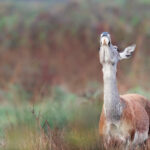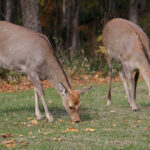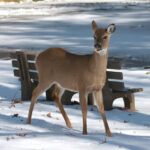Many of us, whether we’re driving or hunting, have come across deer in our lives. Chances are, we’ve seen them staring blankly at headlights before nearly (or actually) jumping in front of a car. Or they fall victim to very obvious hunting tricks.
While we may see that and think, “why are deer so dumb?” the real question should be, “are deer actually as dumb as we think?”
Table of Contents
Why Are Deer So Dumb?
While deer are not as smart as humans, their intelligence can be measured by their sensory input and survival instincts; not so much by their problem-solving skills.
When facing the world of humans, deer can get scared or confused and can make some poor survival decisions. Witnessing this, we can think deer are dumb.
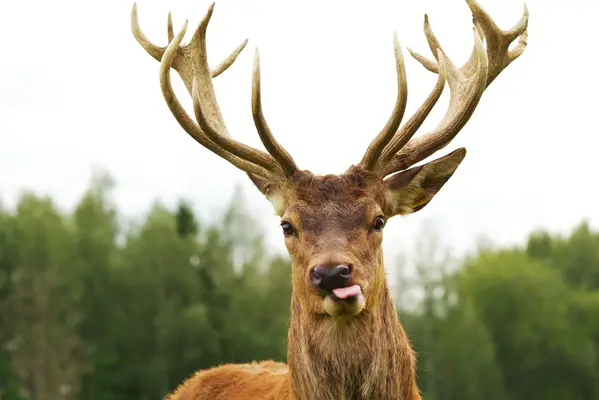
Deer have a hard time overcoming the challenges of human activities like driving and hunting. While this may be common for us, deer have evolved over several thousand years, with inventions like the car or the rifle having existed for a fraction of that.
So while we, with our developed prefrontal cortexes, can look at a deer and think, “what are you doing?” There are explanations for why deer behave poorly in certain situations. And have actually shown great intelligence in many areas of life.
White-tailed deer are particularly notorious for getting themselves into sticky situations. Chances are if you’ve seen a deer do something dumb, it was a whitetail.
Deer and Car Collisions
Probably the most common source of the dumb deer theory, seeing a deer stare blankly into oncoming headlights. This can be a scary and confusing experience for both us and the deer! They could not move at all, or maybe even run toward an oncoming vehicle.
While it is simple for us to recognize the meaning of a fast-moving pair of headlights, that might be the first vehicle a deer has ever experienced.
There is nothing like a car in nature, and deer do not have the frame of reference to know the danger they are in when facing one.
The reason why deer freeze when staring at approaching headlights is sensory overload. Deer have developed a highly tuned night vision to see predators at night. When staring at bright headlights, they are temporarily blinded.
Paired with the increasingly loud sound from the car in their sensitive hearing, a deer might not run or jump the right way to avoid the car and might go towards it.
This is not because they are dumb, they are just unfamiliar with cars and are blinded as they approach.
See also: What Time Of Night Are Deer Most Active?
Easy to Hunt (or are they?)
Deer are also considered easy prey for hunters and don’t show the foresight to identify and avoid hunters.
Deer leave easy-to-spot tracks, have frequently traveled routes that are easy to identify, and walk around during daylight when they are easily visible.
Deer use their mental energy for three main things: eating, surviving, and mating.
They rely on their keen senses of smell and hearing to detect predators. They simply do not have the capacity to think of covering their tracks or refusing food left by hunters.
This is especially true for young deer who have not had the life experiences to recognize dangerous situations and learn from them.
Older deer have shown the ability to adapt during hunting season, making older, bigger, and smarter deer harder to hunt.
And, let me be clear: Deer are not easy to hunt, (just ask any seasoned deer hunter), but younger deer are more susceptible to making mistakes…that is why its so much more difficult to harvest an older buck.
Natural Selection
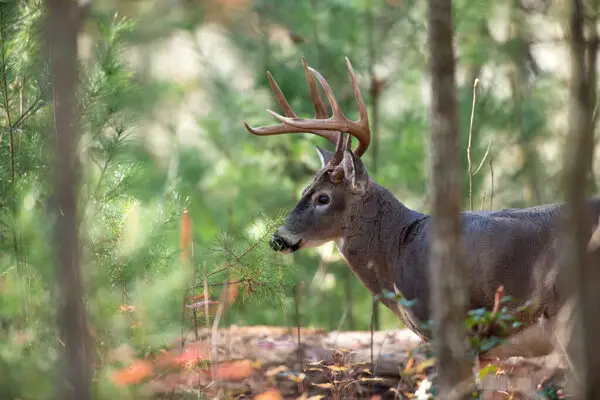
Deer that have good senses and good instincts are able to survive long enough to reach mating maturity. This means that their good instincts get passed down to their offspring so that they may have better survival genes.
Deer are all unique and have their own personalities.
Some deer may be more naturally curious and less cautious around humans, while others could be more skittish and take greater care to avoid humans.
For instance, some deer may be inclined to investigate new enticing sources of food, such as pumpkins people leave out during the holidays. This can lead them into sources of danger that they may not have thought of.
The more cautious tend to have more success surviving. So as natural selection continues and deer evolve to grow more accustomed and experienced around humans, deer intelligence, or how we perceive intelligence, will increase over time.
This is the opposite of domesticated animals that have not needed survival instincts for hundreds or thousands of years. By this measure, you can say deer are more intelligent than most farm animals.
Deer Are Smart During Hunting Season
During hunting season, deer are smart enough to avoid areas where they have seen or heard hunters and will remain hyper-vigilant, monitoring hunters by their scent until they leave.
This is a prime example of deer using their senses and survival instinct as intelligence.
Deer have also been observed to recognize when it is hunting season and change their habits and behaviors accordingly (again, just ask any seasoned deer hunter and they will confirm this!)
Deer, especially Whitetail deer and elk have the magical ability to seemingly disappear once hunting season starts. Some say they have a 6th sense, which is the ability to respond to pressure or human presence.
Then, after hunting season has ended deer are typically back out in plain sight, feeding along highways, in fields, and in urban neighborhoods.
Maybe they deserve more credit than we think…?
Related: Why Is Deer Hunting Season So Short In Many States?
Deer Can Learn from Experience
The ability to learn from experiences is a sign of intelligence and a sign that deer are not as dumb as we think they are. “Dumb” behavior can be attributed to a lack of evolutionary or instinctual knowledge and limits of their senses.
We should not blame the deer or label them as dumb for not having the tools to deal with every situation.
And as deer and human interactions become more frequent, deer will gradually get better survival instincts that will allow them to handle human situations with greater intelligence.
I personally think that deer are one of the most fascinating and intelligent species on the planet. They are extremely adaptable, exhibit a wide range of social behaviors, and, perhaps the coolest of them all, they are masters of their environment.
Thanks for reading!
